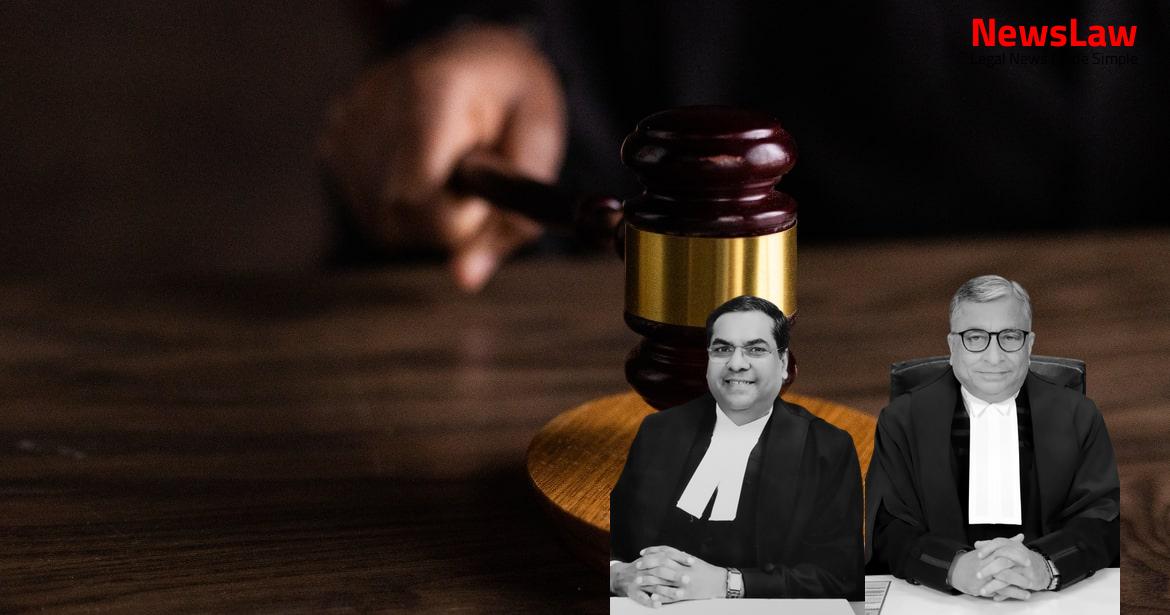The case between the Thakore umedsing nathusing and the Gujarat State, specifically involving the respondent and petitioners, has seen a major development. The High Court’s decision convicting the appellants for offences under Sections 302 and 396 of the IPC has been challenged. The appellants are contesting the judgment, citing unreliable evidence. Dive into the legal complexities surrounding this case and the implications of relying on circumstantial evidence in criminal proceedings.
Facts
- The appellants were convicted for the offence under Section 392 of the IPC and sentenced to 10 years’ rigorous imprisonment.
- The trial court acquitted the appellants of charges under Sections 302, 396, and 397 of the IPC.
- The Division Bench of the Gujarat High Court reversed the trial court’s acquittal and convicted the appellants for the offences under Sections 302 and 396 of the IPC.
- The High Court sentenced the appellants to life imprisonment and upheld the fines and default sentences imposed by the trial court.
- The appellants are challenging the High Court’s judgment, claiming lack of reliable evidence.
- Accused A1 disclosed the names of four co-accused (A2, A3, A4, and A5) during interrogation.
- A1 confessed to the murder of the owner of the jeep and the looting of the vehicle.
- Two separate charge-sheets were filed against the accused for offenses under Sections 302 read with Section 34, and Sections 396 and 397 of the IPC.
- A2 led to the recovery of a blood-stained knife believed to be the weapon used in the offense.
- Four persons alighted from the jeep and tried to flee, leading to their apprehension.
- The prosecution failed to prove A1’s presence in the jeep when it was stopped by the police officer.
- A blood-stained knife was produced by Shobhnaben, wife of Kanji Chhara, at A4’s information.
- A3 and A4 were arrested, with blood-stained clothes being recovered from A3.
- The incriminating articles allegedly recovered at the instance of the accused were not examined by FSL.
- Charges were framed against A1, A2, A3, and A4 in one case and against A5 in another.
- The accused alleged to have hired the victim’s jeep, leading to his murder and the theft of the vehicle.
- Accused No. 4 was acquitted entirely by the trial court.
- Only the blood samples of two accused were sent to the FSL for examination.
Also Read: Case of Ms. D: Juvenile Justice Act Violation
Arguments
- A2, A3 and A5 were convicted based solely on the confessional statement of A1 as recorded by Police Inspector PW-22.
- The confession is deemed inadmissible under Sections 25 and 26 of the Indian Evidence Act, 1872.
- The High Court did not establish that the trial Court’s acquittal was unjust or that there were no two possible views from the evidence.
- The respondent’s counsel argued that the High Court’s findings were based on substantial and convincing circumstantial evidence presented by the prosecution.
- They urged the Court to dismiss the appeals and uphold the High Court’s judgment.
- The respondent’s counsel refuted the claim that the High Court’s findings were speculative and asserted that the accused should not be acquitted.
Also Read: Admission Dispute: State of Maharashtra vs. Appellant in MBBS Course
Analysis
- The prosecution relied on circumstantial evidence like disclosures, recoveries, and discoveries to establish the guilt of the accused.
- Recoveries of weapons and blood-stained clothing were made at the instance of the accused.
- The prosecution pinned the identity of certain accused on the disclosure statement of another accused, which was inadmissible.
- The recovery of items allegedly linked to the accused was not sent for forensic analysis, raising doubts on their reliability.
- The confession of one accused was inadmissible and could not be used as evidence against other accused.
- The High Court’s reliance on this confession to convict other accused was deemed incorrect.
- The trial court’s acquittal of some accused due to insufficient evidence was overturned, leading to a conviction for dacoity with murder.
- Inconsistencies and lack of supporting evidence in police testimonies raised doubts on the recoveries and disclosures made.
- The prosecution’s case heavily relied on circumstantial evidence due to the absence of direct evidence.
- The principles that govern the scope of interference by the High Court in exercise of appellate jurisdiction while dealing with an appeal against acquittal under Section 378(1)(b) CrPC were reiterated by the Hon’ble Supreme Court.
- Re-appreciation of oral and documentary evidence is allowed by the appellate Court in an appeal against acquittal.
- The view taken by the Trial Court must be a possible view based on the evidence on record for the appellate Court not to overturn the acquittal.
- For interference in the order of acquittal, certain conditions must be met including the evidence being consistent only with the guilt of the accused and a complete chain of evidence pointing to the guilt of the accused.
- The recovery of blood-stained weapons alone cannot be considered sufficient evidence to convict an accused of murder.
- The recoveries made in this case were considered highly doubtful and tainted by the Court.
- The prosecution failed to establish the link evidence necessary to prove the safekeeping of the recovered articles.
- Disclosure statements of one accused cannot be used as evidence against the other co-accused.
- The trial Court erred in acquitting the accused for the offences of murder, loot, and dacoity despite ample material connecting them to the crime.
- The principles for proving charges based on circumstantial evidence as outlined by the Supreme Court in the case of Sharad Birdhichand Sarda were referred to in this judgment.
- The conviction of the accused under Section 392 is based on inadmissible and unreliable circumstantial evidence.
- The High Court did not find the trial Court’s acquittal view as perverse or not a permissible view.
- The High Court’s judgment lacks substantial evidence and relies on conjectures and surmises.
- The judgment of the High Court does not meet the mandatory satisfaction required to reverse an acquittal.
- The trial Court’s judgment of convicting the accused under Section 392 IPC is also unsustainable.
Also Read: Kozyflex Mattresses Pvt. Ltd. vs. SBI General Insurance Co. Case Summary
Decision
- The appeals have been allowed
- The judgments in question have been quashed and set aside
- Any pending applications have been disposed of
- The appellants have been acquitted of the charges
- The appellants are directed to be set at liberty forthwith unless required in another case
Case Title: THAKORE UMEDSING NATHUSING Vs. STATE OF GUJARAT (2024 INSC 198)
Case Number: Crl.A. No.-000250-000250 / 2016



